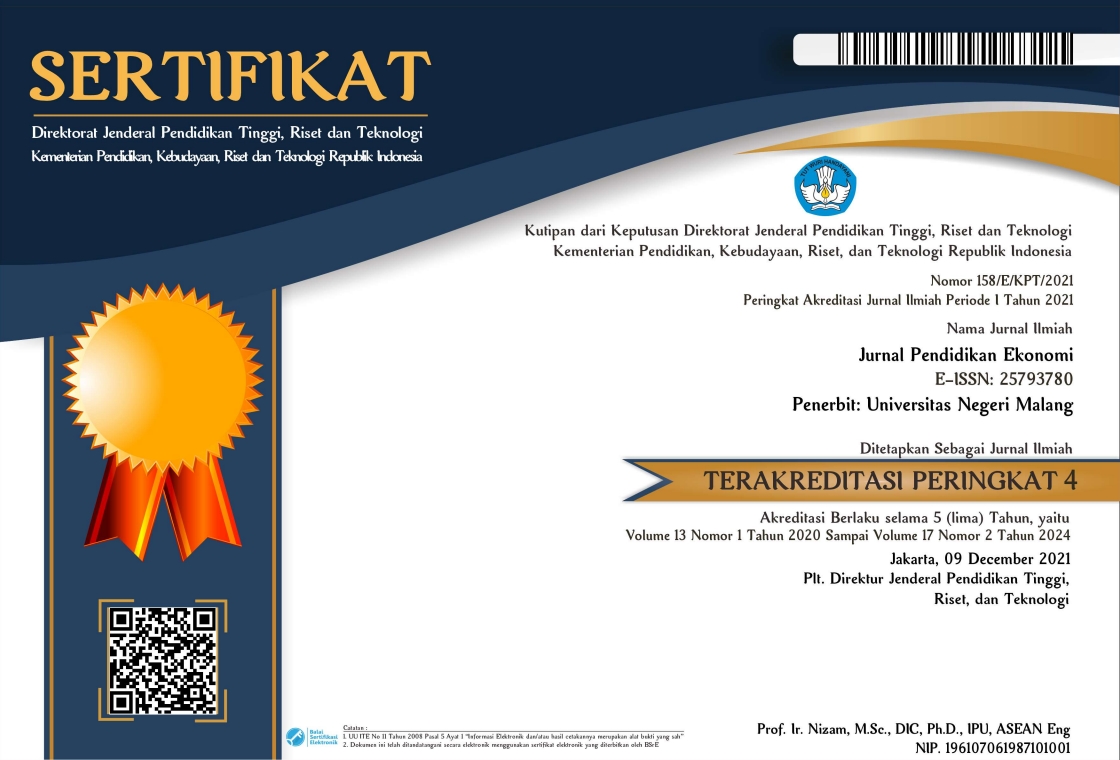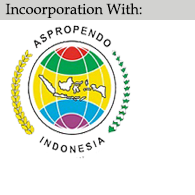Pengaruh Problem Based Learning dan Pendekatan CTL Berbasis ESD Terhadap Kemampuan Berpikir Kritis Dalam Pembelajaran Hybrid di Era New Normal
Abstract
Activities inlearning hybrid in the new normal era, students' critical thinking skills at SMA Negeri 16 Surabaya have not been achieved optimally. The purpose of this study is to analyze the influence of the application of themodel Problem Based Learning and the ESD-based CTL approach on critical thinking skills inlearning hybrid in the new normal era. The type of approach in this research is quantitative while the type of research is causal associative. The sample used as many as 78 students from 97 students of class X Social Sciences SMA Negeri 16 Surabaya obtained through the slovin formula. The data collection stage in the study was carried out through theinstrument items pretest and posttest and for data analysis was carried out using the SPSS-24 application. Based on the analysis of the research results that there are significant differences in the effect of the application of themodel problem based learning and the ESD-based CTL approach on students' critical thinking skills. Models and approaches to learning are one of the important factors to improve critical thinking skills and based on the findings of researchers thatmodels problem-based learning and ESD-based CTL approaches affect students' critical thinking skills inlearning hybrid in the new normal era.
DOI: https://dx.doi.org/10.17977/UM014v15i12022p009
Keywords
Full Text:
PDFReferences
Agus, Alan Haryono. 2021. “Pengaruh Hybrid Learning Dalam Mata Pelajaran Sejarah Terhadap Capaian Berpikir Kritis Siswa Di Sman 1 Lamongan.” Jurnal Unesa 11.
Amin, Saiful, Sumarmi, Syamsul Bachri, Singgih Susilo, and Abdul Bashith. 2020. “The Effect of Problem-Based Hybrid Learning (PBHL) Models on Spatial Thinking Ability and Geography Learning Outcomes.” International Journal of Emerging Technologies in Learning 15(19):83–94. doi: 10.3991/ijet.v15i19.15729.
Fadillah, Annisa, Ni Putu, Laksmi Cintya, Dimas Ridho, and Ahmad Nurkholis. 2017. “The Effect of Application of Contextual Teaching and Learning ( CTL ) Model-Based on Lesson Study with Mind Mapping Media to Assess Student Learning Outcomes on Chemistry on Colloid Systems.” 1(2):101–8. doi: 10.20961/ijsascs.v1i2.5128.
Fausan, M. M., & Indah Panca Pujiastuti. (2017). Pengaruh Pendekatan CTL Berbasis Nht Terhadap Motivasi, Hasil Belajar IPA, Dan Retensi Siswa. April. https://doi.org/10.22219/jpbi.v3i2.4278
Gultom, E. M., Syahputra, E., & Amin Fauzi, K. M. (2020). Differences in Students’ Mathematical Communication Ability through the Application of Batak Culture-OrientedGultom, E. M., Syahputra, E., & Amin Fauzi, K. M. (2020). Differences in Students’ Mathematical Communication Ability through the Application of B. International Journal of Multicultural and Multireligious Understanding, 7(10), 731. https://doi.org/10.18415/ijmmu.v7i10.2236
Hanifah, S. P. dan A. N. (2021). Education for Sustainable Development (ESD) dalam Pembelajaran IPA. JKPI: Jurnal Kajian Pendidikan IPA, 1(2), 53–61.
Hilda Marta, Yanti Fitria, Hadiyanto, A. Z. (2020). Penerapan Pendekatan CTL. Jurnal Basicedu, 4, 149–157.
Matthews, P. (2016). Education for Sustainable Development in Further Education: A Reality Check. In Education for Sustainable Development in Further Education. https://doi.org/10.1057/978-1-137-51911-5_15
Nafiah, Y. N., & Suyanto, W. (2014). Penerapan Model Problem-Based Learning Untuk Meningkatkan Keterampilan Berpikir Kritis Dan Hasil Belajar Siswa. c, 125–143.
Nurhayati, Lia Angraeni, W. (2019). Pengaruh Model Problem Based Learning, Kemampuan Berpikir Kritis Terhadap Kemampuan Berpikir Tingkat Tinggi. 11(1), 12–20.
Prakoso, A. F. (2017). Penerapan Contextual Teaching And Learning ( CTL ) Dengan Metode Problem Solving Dalam Meningkatkan Hasil Belajar Kajian. April.
Prasetyo, F., & Kristin, F. (2020). Pengaruh Model Pembelajaran Problem Based Learning dan Model Pembelajaran Discovery Learning terhadap Kemampuan Berpikir Kritis Siswa Kelas 5 SD. Didaktika Tauhidi: Jurnal Pendidikan Guru Sekolah Dasar, 7(1), 13. https://doi.org/10.30997/dt.v7i1.2645
Pratama, Aldo Putra. 2021. “Pengaruh Pembelajaran Daring Terhadap Motivasi Belajar Siswa SD.” Pendidikan Guru Sekolah Dasar 2:88–95.
Pratiwi, I. I., Wijaya, A. F. C., & Ramalis, T. R. (2019). Penerapan Pbl Dengan Konteks Esd Untuk Meningkatkan Hasil Belajar Kognitif Peserta Didik. VIII, SNF2019-PE-1–8. https://doi.org/10.21009/03.snf2019.01.pe.01
Rahmadi, A. (2021). Hybrid Learning, Terobosan Sistem Pembelajaran Masa Transisi. Banyuwangi: radarbanyuwangi.id.
Sari, N. P., Budijanto, B., & Amiruddin, A. (2017). Pengaruh Penerapan Model Pembelajaran Problem Based Learning Dipadu Numbered Heads Together Terhadap Keterampilan Metakognitif Dan Kemampuan Berpikir Kritis Geografi Siswa SMA. Jurnal Pendidikan: Teori, Penelitian, Dan Pengembangan, 2(3), 440–447. http://journal.um.ac.id/index.php/jptpp/article/view/8720
Setyorini, U., Sukiswo, S. E., & Subali, B. (2011). Penerapan Model Problem Based Learning Untuk Meningkatkan Kemampuan Berpikir Kritis Siswa Smp. Jurnal Pendidikan Fisika Indonesia, 7(1), 52–56. https://doi.org/10.15294/jpfi.v7i1.1070
Sugiyono. (2017). Metode Penelitian Kualitatif, Kuntitatif dan R&D. Bandung: CV. Alfabeta.
Surjanti, J., Budiono, & Nugroho, D. (2018). Antecedents Individual Entrepreneurial Orientation (IEO): Problem Based Learning (PBL). Journal of Business & Retail Management Research, 13(02). https://doi.org/10.24052/jbrmr/v13is02/art-12
Surjanti, J., Soejoto, A., & Nugroho, D. (2020). Social Sciences & Humanities Open Mangrove forest ecotourism : Participatory ecological learning and sustainability of students ’ behavior through self-ef fi cacy and self-concept. Social Sciences & Humanities Open, 2(1), 100009. https://doi.org/10.1016/j.ssaho.2019.100009
Wijayanti, A., & Wulandari, T. (2016). Efektivitas Model Ctl Dan Model PBL Terhadap Hasil Belajar IPS. Harmoni Sosial: Jurnal Pendidikan IPS, 3(2), 112–124. https://doi.org/10.21831/hsjpi.v3i2.7908
Refbacks
- There are currently no refbacks.

Jurnal Penddidikan Ekonomi is licensed under a Creative Commons Attribution-NonCommercial-ShareAlike 4.0 International License





